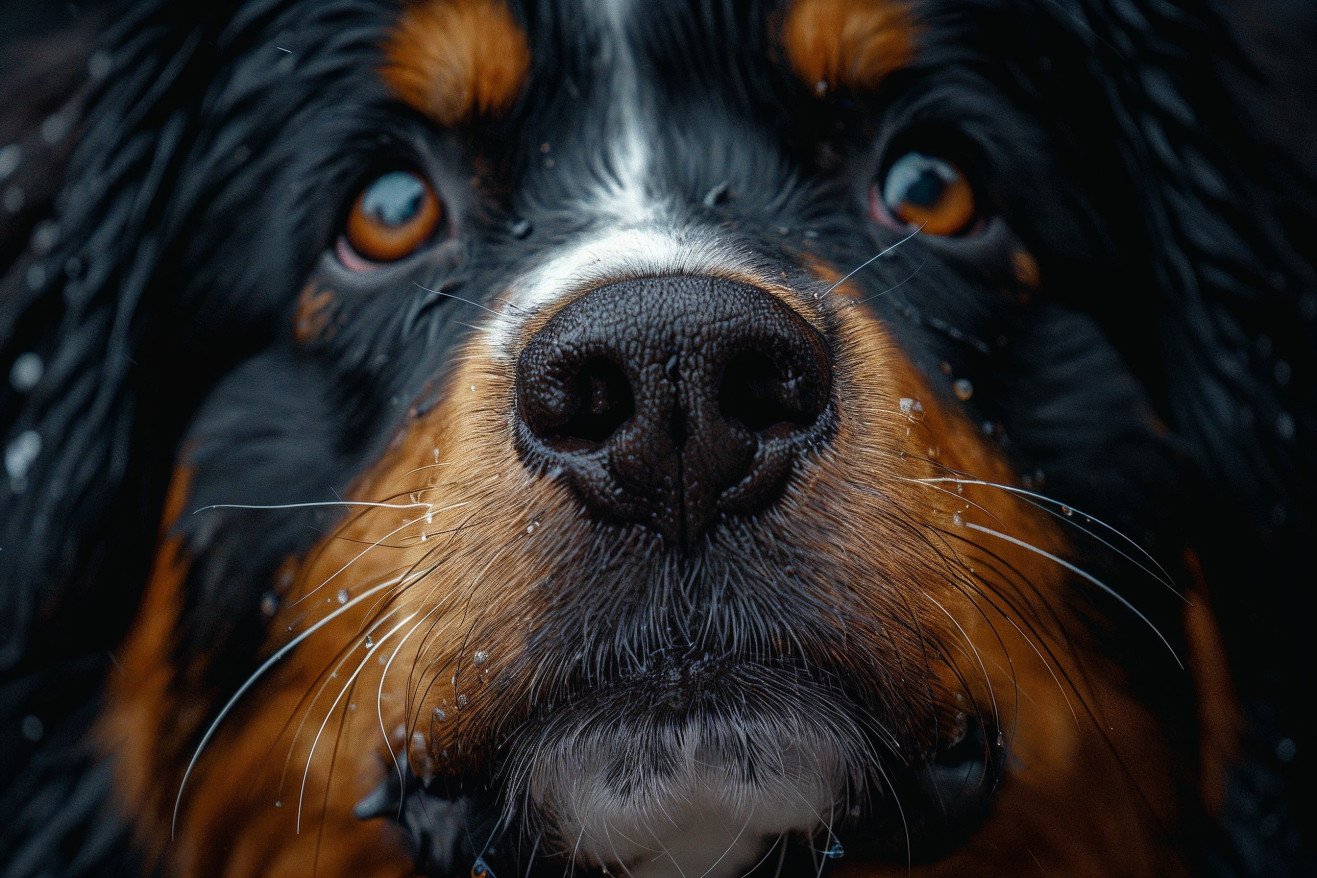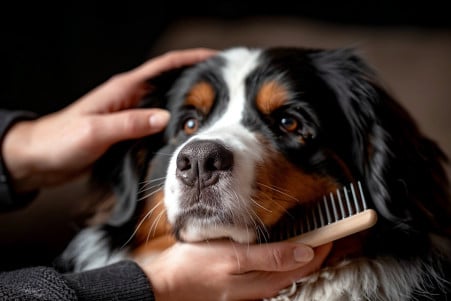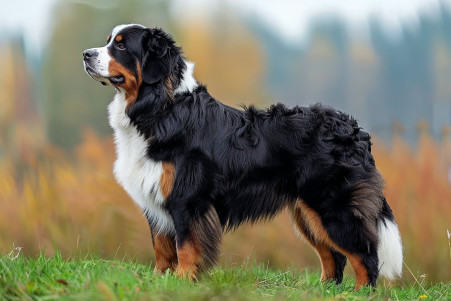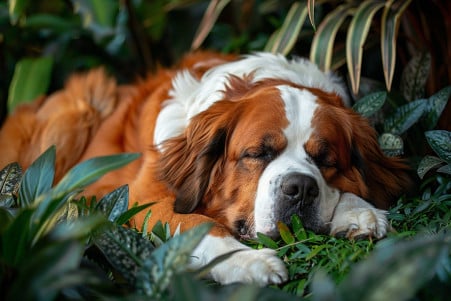Do Bernese Mountain Dogs Drool? What to Know
9 May 2024 • Updated 9 May 2024

If you're thinking about bringing a sweet Bernese Mountain Dog into your home, but are worried about how much drool you'll have to deal with, you're smart to be concerned. These large, fluffy dogs are known to drool, thanks to their loose lips and the amount of saliva they produce, but with the right training and care, you can keep it to a minimum.
Although there's no getting around the fact that Bernese Mountain Dogs drool, in this article, we'll take a deep dive into the genetics that make this breed so slobbery, how much drool you can expect, and what the experts have to say about how to keep the drool from taking over your life. We'll cover information from veterinary studies, breed experts, and long-time Berner parents to help you better understand and control the moderate-to-heavy drooling that often accompanies these great family pets.
Do Bernese Mountain Dogs drool?
The Anatomy of Bernese Mountain Dog Drool
The reason Bernese Mountain Dogs are such heavy droolers can be attributed to their specific facial structure. According to The Spruce Pets, the breed's "low-hanging jowls and drooping upper lips" are the perfect setup for saliva to collect and fall out. In addition, the breed's large, square muzzle and big mouth mean they produce more saliva than many other breeds.
According to the American Kennel Club, dogs like the Bernese Mountain Dog "have extra skin around their lips and muzzle, which allows saliva to collect in the folds" and then drool out. This extra skin is a breed standard and is meant to enable the breed's characteristic drooling.
However, while some drooling is normal and expected for the Bernese Mountain Dog, Cinder Rock Veterinary Clinic notes that "excessive drooling in these breeds isn't always normal." It's important to know the difference between the breed's natural drooling and excessive drooling, as the latter could be a sign of a health issue that needs to be addressed by a vet. That said, by learning about the breed's facial structure and how it enables drooling, owners can be better prepared to deal with this messy yet lovable trait.
Health Problems That May Cause Excessive Drooling
While some drooling is to be expected with Bernese Mountain Dogs, especially after eating or drinking, excessive drooling can be a sign of an underlying health issue that needs to be addressed by a vet. According to Hepper, dental issues such as gum disease and tartar buildup can cause drooling because the dog's gums are irritated and rub against their jowls. In addition, Dogster says that nausea, anxiety, certain medications, and neurological issues can also cause Bernese Mountain Dogs to drool more than usual.
Dog owners should pay attention to their dog's drooling habits and if they notice that their dog is drooling more than usual or drooling in a way that's out of the ordinary, they should take their dog to the vet. As PetMD points out, if there is an underlying issue, catching it early will make it easier to treat and will help prevent any complications for these sweet, if sometimes drooly, dogs.
How to Deal With Drool: Advice and Best Practices for Bernese Mountain Dog Owners
While you won't be able to stop a Bernese Mountain Dog from drooling entirely, there are ways to deal with it and keep the mess to a minimum. The American Kennel Club says that regular dental care, including brushing and professional cleanings, can help prevent the dental issues like tartar and gum disease that can cause excessive drooling.
You can also use furniture covers, towels, or bandanas around the dog's neck to help catch and control drool, according to the Cinder Rock Veterinary Clinic. And keeping a cloth nearby to clean your dog's face after they eat or drink can help keep drool in check around the house.
Make sure your dog has plenty of water and pay attention to how much they're drooling to help catch any potential issues early, says the Ferguson Animal Hospital. While drooling is a fact of life for Bernese Mountain Dogs, keeping up with their dental care and finding ways to manage their drool can help make sure your home stays clean and your dog stays healthy.
How to Groom a Bernese Mountain Dog
Bernese Mountain Dogs have a long, thick double coat that needs regular grooming to keep it looking its best. As Espree notes, the breed is one of four types of Swiss Mountain Dogs with a long, silky coat. Their long, thick fur is ideal for colder weather, but it can be problematic in hot weather.
Regular brushing several times a week is important to help control shedding and remove loose hair. Wahl USA notes that using the right tools, including a slicker brush and rake comb, is important for successful grooming. Meanwhile, wikiHow recommends running a comb through the undercoat and topcoat before brushing to help work out any mats.
In addition to regular brushing, the Bernese Mountain Dog's coat will also benefit from the occasional bath using lukewarm water and a dog-formulated shampoo. Not only will regular grooming help maintain the breed's appearance, but it will also help prevent matting and tangling, which can lead to drooling. By making sure to keep up with their regular grooming routine, owners can make sure their Bernese Mountain Dogs are as comfortable and healthy as possible.
Common Health Issues for Bernese Mountain Dog Parents
Bernese Mountain Dogs have a shorter life expectancy of 7-10 years and are known to have several health problems, according to PetMD. The most common health issues for the breed include hip and elbow dysplasia, several types of cancer, and bloat. Spot® also notes that eye issues such as progressive retinal atrophy, as well as allergies and bleeding disorders like Von Willebrand's Disease, are potential problems.
These health issues can be managed and even prevented with proper nutrition, ensuring puppies don't grow too quickly, and regular vet visits, according to Midway Animal Hospital. Knowing what to look out for can help dog parents make sure their Bernese Mountain Dogs get the best care and treatment as soon as possible.
Conclusion: Accepting the Drool and Caring for Your Bernese Mountain Dog
Most Bernese Mountain Dogs are moderate droolers, although some may only drool after eating or drinking. However, a few dogs in the breed drool constantly or not at all. Dogster says that the loose skin around the muzzle and the breed's jowls allow saliva to pool and drip out, which is why Bernese Mountain Dogs tend to drool.
However, excessive drooling in Bernese Mountain Dogs can be a sign of an underlying health problem, including dental issues, nausea, anxiety, and neurological problems. PetMD explains that drooling can be a sign of periodontal disease, and the irritated gums can cause increased drooling as they rub against the loose skin and jowls. Pet owners should keep an eye on their dog's drooling and seek veterinary care if it becomes excessive or changes in any way.
While you can't stop a Bernese Mountain Dog from drooling, you can manage and minimize it. Cinder Rock Veterinary Clinic suggests using furniture covers, towels, or bandanas around the neck to catch and contain drool. Regularly brushing the dog's teeth can also help prevent issues that cause excessive drooling.
Knowing the breed's typical traits and common health concerns will help you be a responsible and well-informed Bernese Mountain Dog owner. With the right care and attention, you can learn to love your Bernese Mountain Dog's drooling as a charming part of their personality.


